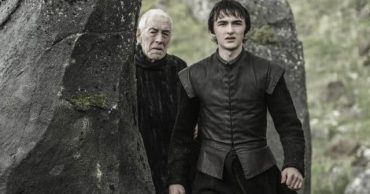
Exploring the Lighter Side of Game of Thrones
With such an early dramatic crescendo at The Purple Wedding, it’s no surprise that “Oathkeeper” feels like a very light episode of Game of Thrones. Directed by the wonderful Michelle McLaren (and scripted by Bryan Cogman), “Oathkeeper” relies on building atmosphere where it lacks in plot or character development, a series of visually arresting, performance-driven scenes whose significance lies in what the future holds, not necessarily what is or isn’t happening right now. It’s a classic “in-between” hour of Game of Thrones, a contemplation on the definition of ‘justice’ and the significance of ‘oaths’ in different parts of Westeros, both north and south of The Wall.
Honor and Duty in the Dark Corners of Westeros
As the title suggests (a reference to Brienne’s new Valyerian sword), “Oathkeeper” is an episode about the darker side of honor and duty – that’s why characters like Littlefinger, Karl (the leader of the mutineers, a wonderfully unsettling Burn Gorman), and the show’s ultimate examination of those themes, Jamie, are the episode’s focal points. Westeros is a world defined by the allegiances of those within it, the contradictions between words and actions (a great example of this is Allister: belittling Snow in front of his brothers, then sending him off on a mission with the hopes he’ll be killed by the mutineers) – or in the case of others like Brienne and even Hodor, the great honor and punishment (respectively) that await those who actually keep their vows and promises to others.
Jamie Lannister: The Ultimate Litmus Test
Unsurprisingly, the Kingslayer makes for a great anchor for the episode’s themes (in part because Coster-Waldau’s performance is consistently awesome), a man who took vows for a woman he’d never marry, killed the King he swore to protect to save the kingdom, and stood by helpless while another King (his son) died in his sister’s arms. There’s no greater litmus test for the murky morality of Westeros than Jamie Lannister – especially in the light of last week’s shocking events, something that’s neither referenced or alluded to throughout “Oathkeeper”. Despite the absence, the contrast of character in both episodes only drives the ultimate philosophy of Game of Thrones home even further: even those who seem honorable have dark sides – and when things become personal, the idea of “justice” often supersedes that of honor.
Justice: A Personal and Subjective Concept
Justice is such a personal, subjective thing (save for the most extreme of cases, of course – though even that could be argued) – most would argue that Joffrey ‘deserved’ to die, except (some) of the Lannisters. Cersei certainly has her own definition of justice, sending Jamie (or so she thinks) to fetch Sansa’s head, and planning to legally murder Tyrion – again, her personal quest for vengeance has overridden any assumed loyalty to house, kingdom, or blood relative.
Other characters are using funneling that quest for vengeance into more prosperous activities: while Cersei crumbles at the Capitol, “Oathkeeper” opens with Dany’s latest conquest, turning the slaves of Meereen against their owners and nailing them to the signs they hung children from. Certainly a form of “justice”… but isn’t she just doing the same thing they did to their slaves? Her own advisers consider it a little harsh, but Dany remains steadfast; “I shall meet injustice with justice,” she informs Barristan, reinforcing, if only briefly, the notion that although Westeros has a lot of assumed customs and traditions associated with ‘justice’, those in power can manipulate it however it may fit them.
Setting the Stage for Future Storylines
Though parts of “Oathkeeper” understandably feel scattered – like the long, quiet closing scene with the White Walker’s Fortress of Ice Baby Creature Making Solitude – most of it works well in service of the episode’s ideological musings, catalyzing new story lines (I’m really excited for Brienne and Podrick’s travels) and gathering steam for narrative dominoes to fall later (Jon Snow’s trip to Craster’s Keep, where Bran awaits with a chained up Hodor). Thanks to the expert direction and writing (not to mention the many notable performances), “Oathkeeper” often doesn’t feel like the treadmilling episode it is.
Other Thoughts and Observations
– Greyworm is spending some quality time with Dany’s translator, which can only lead to naughty things later.
– Littlefinger is headed to the Eyrie to marry Lysa Arryn (which begs the question Game of Thrones will never answer: did Littlefinger have Jon Arryn killed?), and clearly plans to teach Sansa a few things on the way (though again, I could do without the creepy suggestions of rape when he holds Sansa’s hand and tells her he wants “everything”).
– Was Olenna originally supposed to be engaged to Aemon? I wonder if that’s who she was talking about – that would be hilarious.
– Tommen has a cat named Ser Pounce!
– I’m assuming that was Gilly’s baby that ended up in the hands of the Ice Zombie Baby Maker.
[Photo via Helen Sloan/HBO]
 Follow Us
Follow Us





Tommen’s cat is named Ser Pounce, not Sir Pants.
And I don’t think it is safe to assume the White Walker baby is Gilly’s. How would Gilly’s baby get from Mole’s Town (south of Castle Black) to Craster’s Keep with the Wall in between? Likely just the kid of one of Craster’s other daughters/wives.
It’s Ser Pounce…
Also, that baby was not Gilly’s… I’m truly not sure how you got that… It was the baby that the Night’s Watch at Crasters offered up to the White Walkers.
most of this episode never happened in the books.